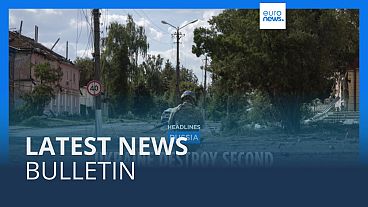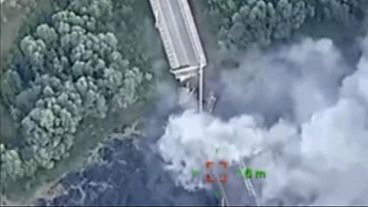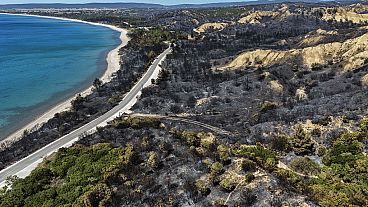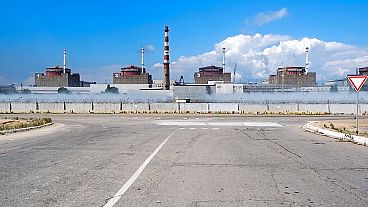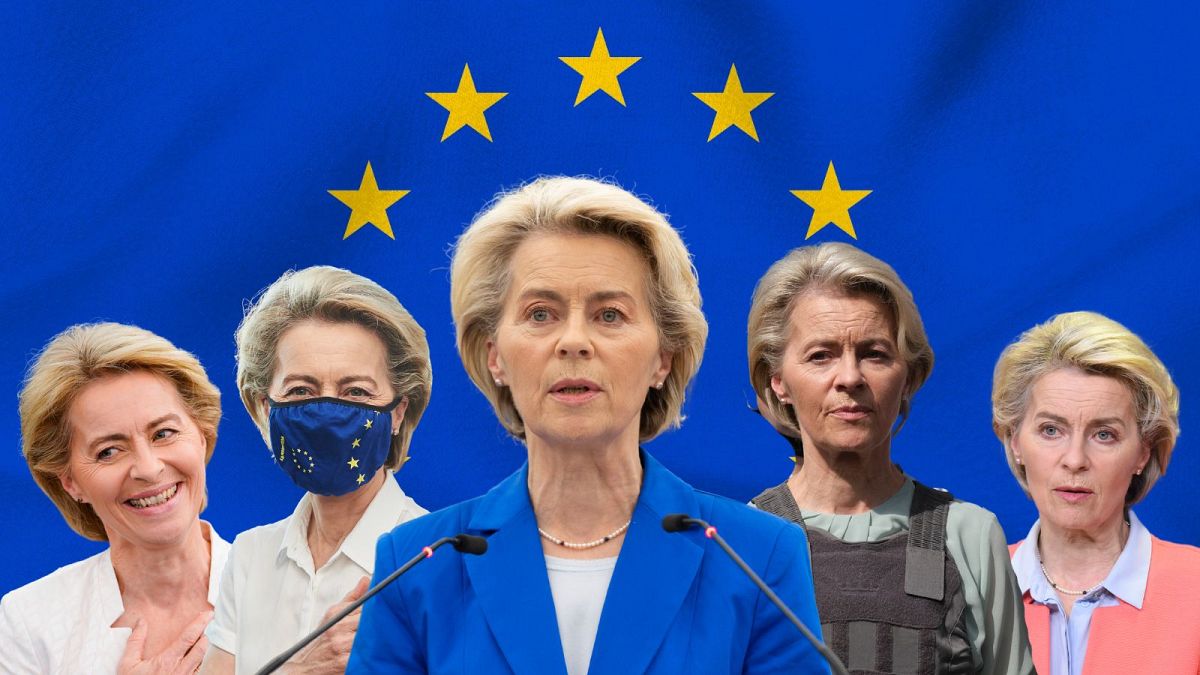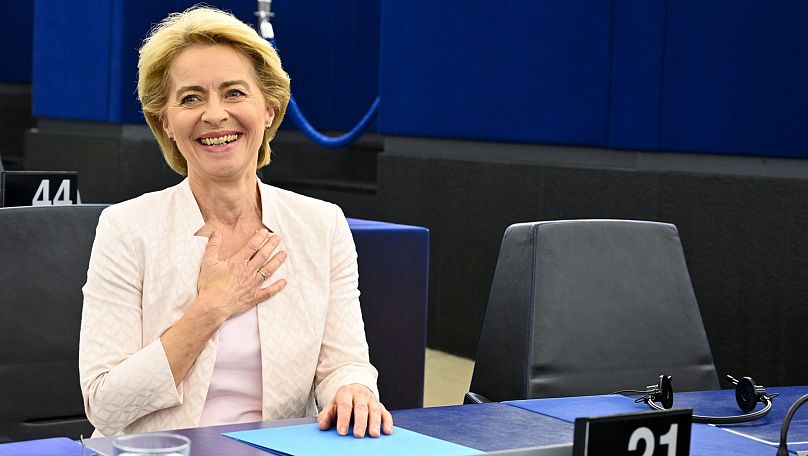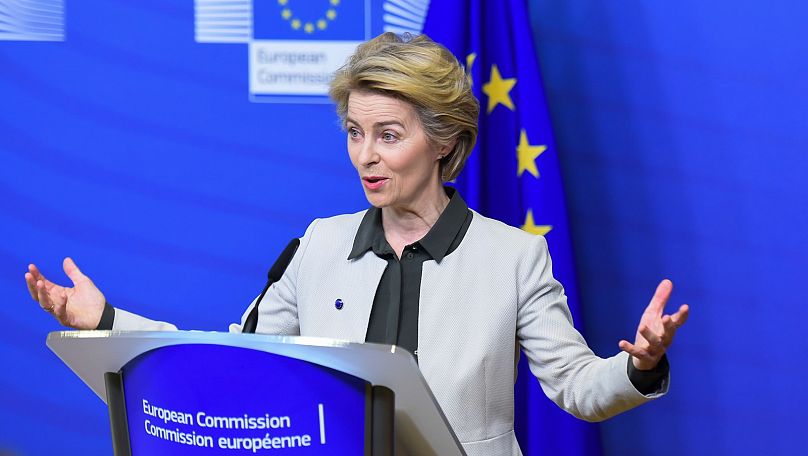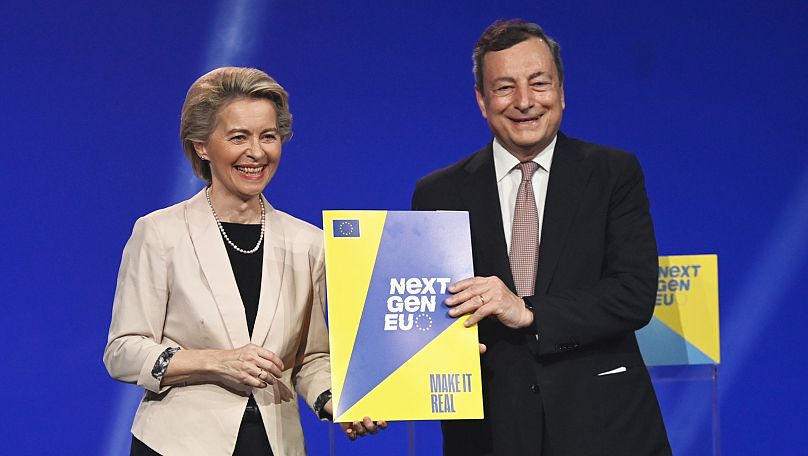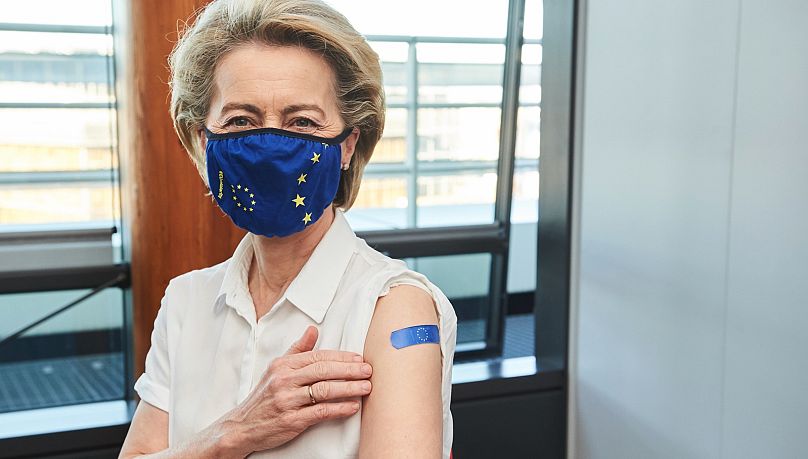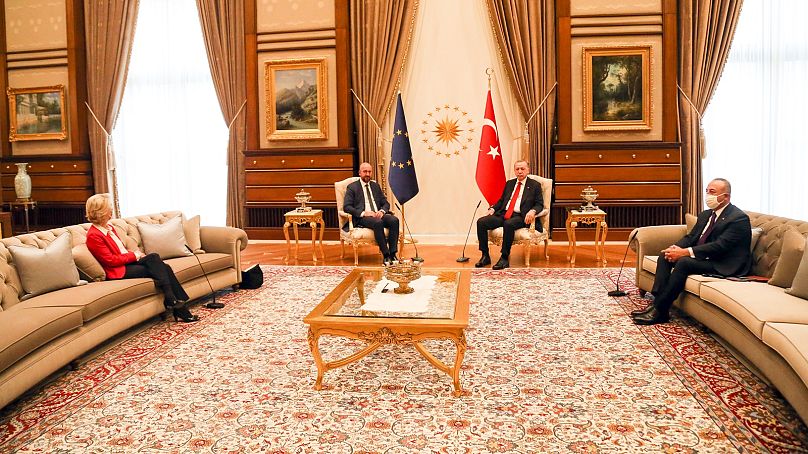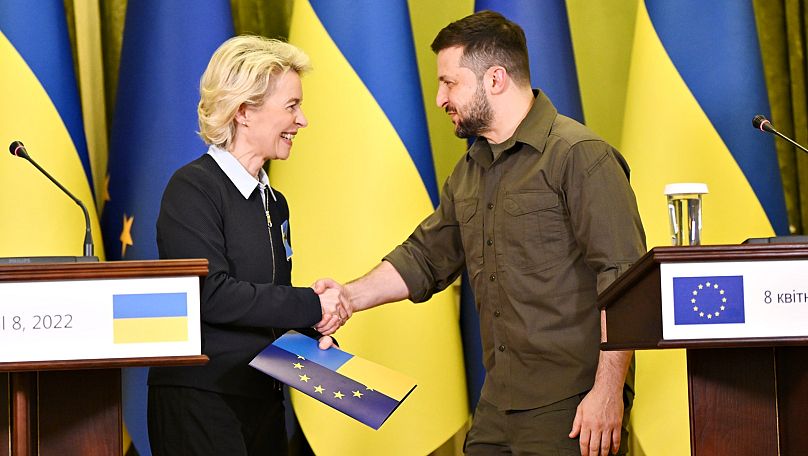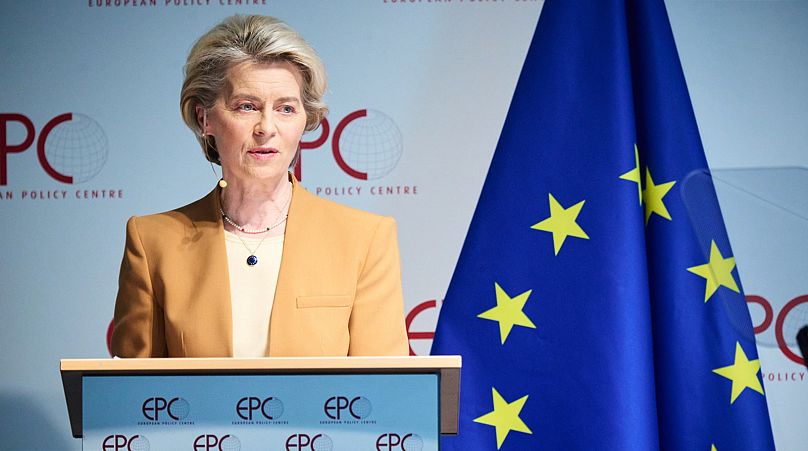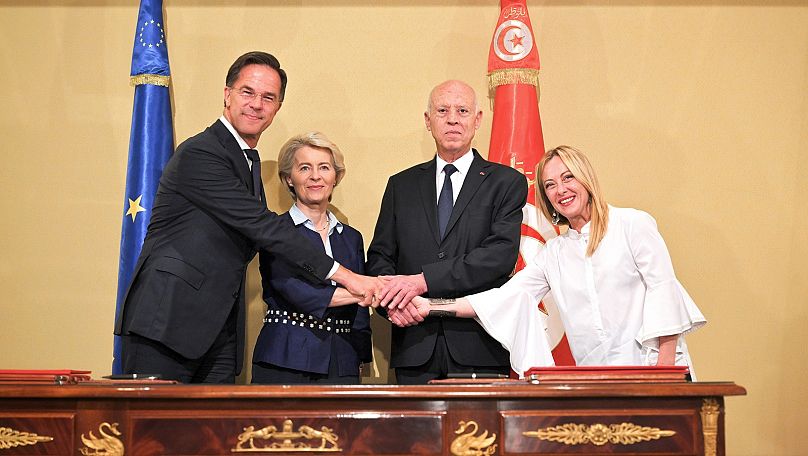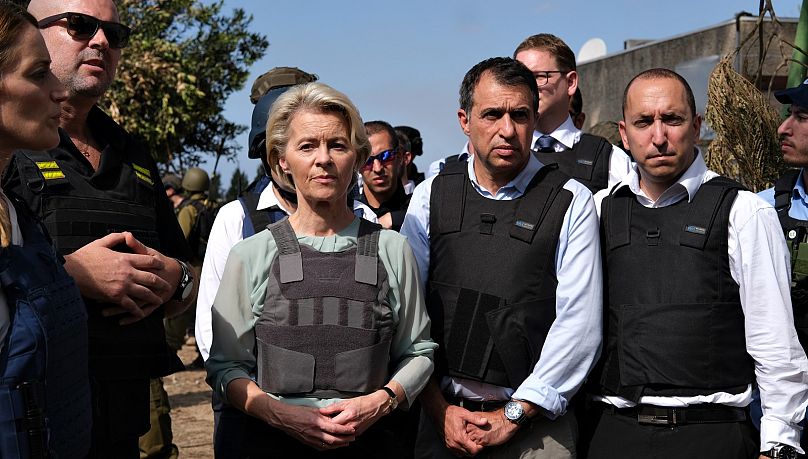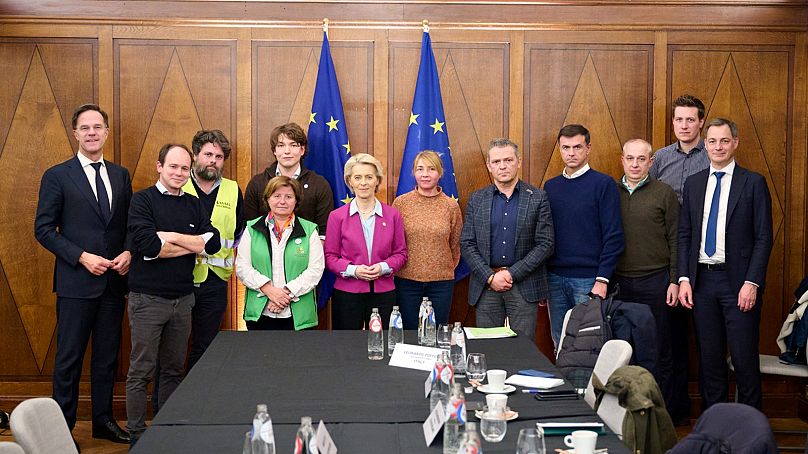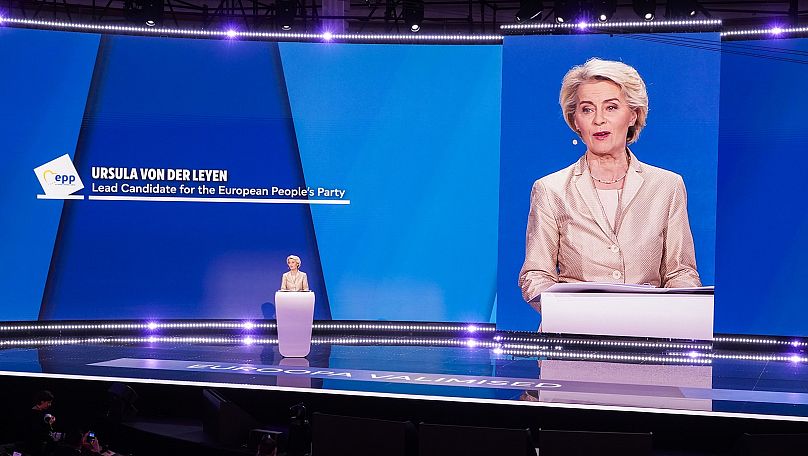She made history when she was elected the first female president of the European Commission. Now she's down for a rerun.
Ursula von der Leyen has been tipped to run the most powerful institution in the European Union for a second time.
After facing a grilling in Strasbourg, the candidate received 401 votes in favour and 284 against, a large majority to support another five-year term.
"I cannot begin expressing how much I am grateful for the trust of the majority of the European Parliament," she said after her re-election. "It sends a strong message of recognition of the work we have done together."
As the 65-year-old German begins to assemble her new administration, Euronews looks back at the 11 moments that defined her first presidency.
Her historic election
Ursula von der Leyen seemingly came out of the blue.
The Brussels-born mother of seven was an unknown figure in the city when leaders got together in July 2019 and, under the strong influence of French President Emmanuel Macron, chose her to oversee the executive. Von der Leyen, who was then serving as defence minister in Germany, had not featured in the top jobs conversation at all so her elevation came as an absolute surprise.
The European Parliament reacted furiously to the summary execution of the Spitzenkandidaten system and almost voted her down: von der Leyen received 383 votes in favour, just nine above the minimum threshold.
"There is only one option for me: to unite and strengthen Europe," she said.
Wearing white, the colour traditionally associated with the Suffragette movement, von der Leyen became the first woman to be elected president of the European Commission.
Her 'man on the moon'
Soon after entering the Berlaymont, von der Leyen made the announcement that would define her entire presidency.
On 11 December 2019, she presented the European Green Deal, a far-reaching roadmap to transform the bloc's economy and achieve climate neutrality by 2050. The growth model based on fossil fuels, she said, was "out of touch with the planet" and had to be replaced with a new strategy that "gives more back than it takes away."
"We do not have all the answers yet. Today is the start of a journey. But this is Europe's 'man on the moon' moment," she declared.
Thus began an impressive succession of legislative proposals that included the first-ever carbon border tax, a gradual ban on the combustion engine and a €65-billion special fund to support citizens most at risk by the transition.
Although von der Leyen managed to push the Green Deal forward despite the global crises that hit the bloc, each passing law became the focus of greater controversy.
Her recovery fund
The COVID-19 pandemic brought the EU to a complete standstill: factories, offices, shops, schools, restaurants, theatres, clubs – all were forced to shut down. The paralysis caused a sudden, brutal recession that seriously threatened the livelihoods of millions of workers, fuelling fears of mass unemployment and widespread poverty.
Building upon a joint proposal by Germany's Angela Merkel and France's Emmanuel Macron, von der Leyen designed a €750-billion recovery fund to fire up the dormant economy, modernise its infrastructure and turbocharge the green transition. The fund was split into grants and low-interest loans, allocated according to national requests.
"This is Europe's moment. Our willingness to act must live up to the challenges we are all facing," von der Leyen said in May 2020 as she presented the blueprint.
Dubbed "Next Generation EU," the pool was financed through the issuance of common debt at a large scale, a step long resisted by frugal countries opposed to a genuine fiscal union. Observers hailed the moment as Hamiltonian and taboo-breaking.
Her truncated V-day
The purchase of COVID-19 vaccines was another ambitious initiative for von der Leyen.
On paper, the idea was simple: the European Commission would negotiate contracts with pharmaceutical companies to guarantee the same prices for all member states and prevent a race to the bottom between the richest and the poorest.
"Today, we start turning the page on a difficult year," she said in December 2020, calling the start of vaccination, or V-day, a "touching moment of unity."
But it soon went off track. Pfizer and, most notoriously, AstraZeneca failed to deliver as many doses as expected, prompting delays in vaccination campaigns and the fury of many capitals. Fearing EU-made vaccines were being shipped to Britain, von der Leyen's team reacted with a regulation to control exports, which was heavily criticised as protectionist and (accidentally) triggered a nuclear Brexit clause.
The truncated roll-out took a new twist when it was revealed that von der Leyen had negotiated a multi-billion deal directly with Pfizer's CEO Albert Bourla. When the Commission refused to release the texts of their conversation, the New York Times filed a lawsuit and the Ombudsman opened an investigation. The #Pfizergate had begun.
Her Sofagate
Von der Leyen flew to Turkey in April 2021 accompanied by Charles Michel, the president of the European Council, to meet with President Recep Tayyip Erdoğan and his then-foreign minister, Mevlüt Çavuşoğlu, to discuss ways to improve EU-Turkey relations.
But the Turkish hosts had set up only two chairs in the meeting room: one for Erdoğan and one for the EU side. Michel went ahead and took the available chair, while von der Leyen was relegated to a nearby sofa, sitting opposite Çavuşoğlu, whom she outranked.
The incredibly awkward image immediately became viral and inspired commentary about sexism in politics. Under fire for the role he played in the incident, Michel published a lengthy apology but critics were unconvinced. A few days later, von der Leyen had her revenge in a candid speech before the Parliament.
"It happened because I am a woman. Would this have happened if I had worn a suit and a tie?" she told MEPs. "I felt hurt and left alone."
The so-called #Sofagate brought to light the simmering rivalry between von der Leyen and Michel, which, rather than recovering, only worsened over the years.
Her first week of war
Vladimir Putin's decision to attack Ukraine on 24 February 2022 brought the largest armed conflict since World War II to the EU's doorstep.
With Chancellor Angela Merkel freshly out of office and President Emmanuel Macron ridiculed for his (failed) attempts to change Putin's mind, von der Leyen aptly positioned herself as the bloc's leading voice in the conflict.
Speaking from her lectern at the Berlaymont, she announced a raft of sanctions against the Kremlin, including the unprecedented freezing of the Russian Central Bank's assets, and the expansion of an off-budget scheme to finance weapon deliveries to Ukraine, breaking a long-held taboo in the peace-loving union.
Her week concluded with a Euronews interview in which she declared that Ukraine was "one of us and we want them in." Less than two months later, she boarded a train to Kyiv, visited the scenes of the Bucha massacre, and handed President Volodymyr Zelenskyy the official questionnaire to start the EU accession process.
Her big speech on China
Speaking about China has always been an arduous task for the EU: some member states advocate closer ties to foster economic growth; others prefer a hard line to denounce human rights violations and unfair trade practices. This diplomatic cacophony has been smartly exploited by Beijing to advance its interests.
On 30 March 2023, von der Leyen attempted to set the record straight with a 40-minute long speech about EU-China relations that struck for its bold, matter-of-fact nature. Pulling no punches, she accused Beijing of bullying small-sized countries, conducting disinformation campaigns, fusing its military and commercial sectors and promoting an alternative world order "where individual rights are subordinated to national security."
"These escalatory actions point to a China that is becoming more repressive at home and more assertive abroad," she said.
The speech introduced the novel strategy of "de-risking," which was later adopted by the G7 as the official policy to deal with China, and set the scene for a hands-on approach that led to the first-ever economic security strategy, multiple trade investigations, and the imposition of tariffs on China-made electric vehicles.
Her Tunisia deal
Reforming the EU's much-contested, often-ignored migration rules was one of von der Leyen's top priorities since the first day she took office. The "New Pact on Migration and Asylum" went through acrimonious negotiations and eventually made it through but this was not enough with the president choosing to look outwards.
On 16 July 2023, von der Leyen travelled to Tunisia to sign a "memorandum of understanding" that earmarked €150 million in budget support and €100 million in migration management, among other EU-funded envelopes. The logic of the deal was evident: the bloc would prop up Tunisia's wobbly economy and, in return, Tunisia would step up its border controls to prevent the departure of asylum seekers.
"In times of geopolitical uncertainties, it is important to deepen cooperation with our strategic partners," von der Leyen said.
The signature was praised by other EU leaders, including Netherlands' Mark Rutte and Italy's Giorgia Meloni, who joined the president's trip, but raised the ire of MEPs, migration experts and humanitarian organisations, who harshly rebuked von der Leyen for handing out so much cash to Tunisian President Kaïs Saied, a man accused of promoting authoritarian politics, racist tropes and far-right conspiracies.
Unfazed, von der Leyen continued her tour and signed more Tunisia-inspired, EU-funded deals with other neighbouring countries, such as Mauritania, Egypt and Lebanon.
Her trip to Israel
The Hamas-led attack on Israel elicited a raw response from von der Leyen, who denounced "terrorism in its most despicable form" and lighted up the Berlaymont with the Israeli flag.
On 13 October 2023, less than a week after the attack, von der Leyen travelled to Israel to express solidarity and visit the scenes of the massacre. The trip included meetings with President Isaac Herzog and Prime Minister Benjamin Netanyahu.
"In the face of this unspeakable tragedy, there is only one possible response: Europe stands with Israel," von der Leyen said standing next to Netanyahu. "And Israel has a right to defend itself. In fact, it has the duty to defend its people."
Her full-blown support was seen as one-sided as she failed to highlight the suffering of the Palestinian population. Days before her visit, Israel had declared a "complete siege" on the Gaza Strip.
Von der Leyen's actions in the wake of the Israel-Hamas war backfired and stood in stark contrast with her acclaimed, unifying response to the Russian aggression. Although the president later pivoted to balance her rhetoric, the trip took a heavy toll on her reputation.
Her reaction to farmer protests
Farmers delivered another challenge to von der Leyen's political standing by staging protests all across Europe to complain about the cost-of-living crisis, unfair competition, free trade deals and bureaucracy.
The protest movement posed a direct threat to her Green Deal, as farmers honed in on environmental regulations as one of the reasons for their ordeal. With speculation growing over her re-election bid, von der Leyen was put in a corner, caught between her climate legacy and the demands of her political family, the centre-right European People's Party (EPP), which quickly re-fashioned itself as the "farmers' party."
The result was a knee-jerk reaction that included a hastily-designed simplification of the Common Agriculture Policy (CAP) that lowered environmental requirements but kept intact the subsidy levels, and a proposal to make it easier to re-apply tariffs on imports of Ukrainian grain. Von der Leyen also launched a "Strategic Dialogue" with the agriculture sector, withdrew a contentious pesticide law considered doomed to fail, and peppered her public interventions with raves and praises for European farmers.
"Only if our farmers can live off the land will they invest in the future," she told the European Parliament. "And only if we achieve our climate and environmental goals together, will farmers be able to continue to make a living."
Her re-election campaign
Von der Leyen's term at the helm was put under a microscope after she announced her re-election bid, standing as the EPP's Spitzenkadidat, or lead candidate. The move kick-started a campaign that scaled back her presidential profile and brought to the fore her most political instincts.
The switch yielded mixed results. On the one hand, von der Leyen delivered strong performances in the debates against the other lead candidates; on the other, the campaign exposed her divisive character, emboldening her critics and preventing her from visiting some member states.
Controversially, von der Leyen made increasingly explicit overtures to Italian premier Giorgia Meloni and her hard-right group, which enraged progressives and weakened her centrist credentials.
After five years shielded by the solemnity of the Berlaymont, her return to retail politics proved rough and bumpy. But it eventually paid off: the EPP comfortably won the elections and EU leaders nominated von der Leyen for a second term.
"I have demonstrated in my first mandate what a strong Europe can achieve," she said on election night, proving her willingness for a sequel.

